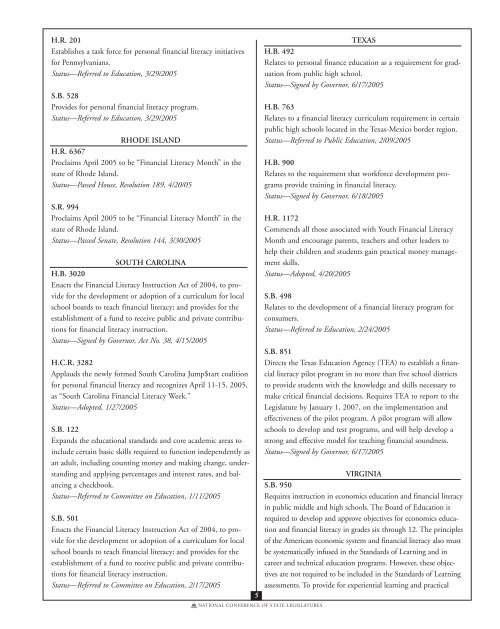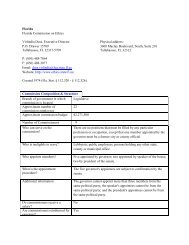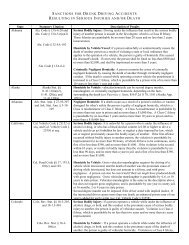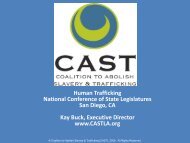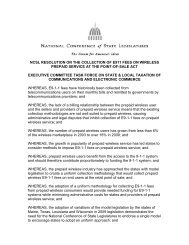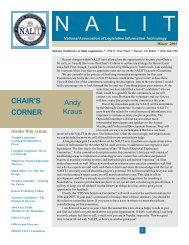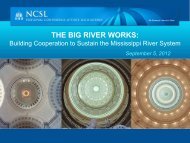Printer Friendly Version - National Conference of State Legislatures
Printer Friendly Version - National Conference of State Legislatures
Printer Friendly Version - National Conference of State Legislatures
You also want an ePaper? Increase the reach of your titles
YUMPU automatically turns print PDFs into web optimized ePapers that Google loves.
H.R. 201<br />
Establishes a task force for personal financial literacy initiatives<br />
for Pennsylvanians.<br />
Status—Referred to Education, 3/29/2005<br />
S.B. 528<br />
Provides for personal financial literacy program.<br />
Status—Referred to Education, 3/29/2005<br />
RHODE ISLAND<br />
H.R. 6367<br />
Proclaims April 2005 to be “Financial Literacy Month” in the<br />
state <strong>of</strong> Rhode Island.<br />
Status—Passed House, Resolution 189, 4/20/05<br />
S.R. 994<br />
Proclaims April 2005 to be “Financial Literacy Month” in the<br />
state <strong>of</strong> Rhode Island.<br />
Status—Passed Senate, Resolution 144, 3/30/2005<br />
SOUTH CAROLINA<br />
H.B. 3020<br />
Enacts the Financial Literacy Instruction Act <strong>of</strong> 2004, to provide<br />
for the development or adoption <strong>of</strong> a curriculum for local<br />
school boards to teach financial literacy; and provides for the<br />
establishment <strong>of</strong> a fund to receive public and private contributions<br />
for financial literacy instruction.<br />
Status—Signed by Governor, Act No. 38, 4/15/2005<br />
H.C.R. 3282<br />
Applauds the newly formed South Carolina Jump$tart coalition<br />
for personal financial literacy and recognizes April 11-15, 2005,<br />
as “South Carolina Financial Literacy Week.”<br />
Status—Adopted, 1/27/2005<br />
S.B. 122<br />
Expands the educational standards and core academic areas to<br />
include certain basic skills required to function independently as<br />
an adult, including counting money and making change, understanding<br />
and applying percentages and interest rates, and balancing<br />
a checkbook.<br />
Status—Referred to Committee on Education, 1/11/2005<br />
S.B. 501<br />
Enacts the Financial Literacy Instruction Act <strong>of</strong> 2004, to provide<br />
for the development or adoption <strong>of</strong> a curriculum for local<br />
school boards to teach financial literacy; and provides for the<br />
establishment <strong>of</strong> a fund to receive public and private contributions<br />
for financial literacy instruction.<br />
Status—Referred to Committee on Education, 2/17/2005<br />
TEXAS<br />
H.B. 492<br />
Relates to personal finance education as a requirement for graduation<br />
from public high school.<br />
Status—Signed by Governor, 6/17/2005<br />
H.B. 763<br />
Relates to a financial literacy curriculum requirement in certain<br />
public high schools located in the Texas-Mexico border region.<br />
Status—Referred to Public Education, 2/09/2005<br />
H.B. 900<br />
Relates to the requirement that workforce development programs<br />
provide training in financial literacy.<br />
Status—Signed by Governor, 6/18/2005<br />
H.R. 1172<br />
Commends all those associated with Youth Financial Literacy<br />
Month and encourage parents, teachers and other leaders to<br />
help their children and students gain practical money management<br />
skills.<br />
Status—Adopted, 4/20/2005<br />
S.B. 498<br />
Relates to the development <strong>of</strong> a financial literacy program for<br />
consumers.<br />
Status—Referred to Education, 2/24/2005<br />
S.B. 851<br />
Directs the Texas Education Agency (TEA) to establish a financial<br />
literacy pilot program in no more than five school districts<br />
to provide students with the knowledge and skills necessary to<br />
make critical financial decisions. Requires TEA to report to the<br />
Legislature by January 1, 2007, on the implementation and<br />
effectiveness <strong>of</strong> the pilot program. A pilot program will allow<br />
schools to develop and test programs, and will help develop a<br />
strong and effective model for teaching financial soundness.<br />
Status—Signed by Governor, 6/17/2005<br />
VIRGINIA<br />
S.B. 950<br />
Requires instruction in economics education and financial literacy<br />
in public middle and high schools. The Board <strong>of</strong> Education is<br />
required to develop and approve objectives for economics education<br />
and financial literacy in grades six through 12. The principles<br />
<strong>of</strong> the American economic system and financial literacy also must<br />
be systematically infused in the Standards <strong>of</strong> Learning and in<br />
career and technical education programs. However, these objectives<br />
are not required to be included in the Standards <strong>of</strong> Learning<br />
assessments. To provide for experiential learning and practical<br />
5<br />
NATIONAL CONFERENCE OF STATE LEGISLATURES


